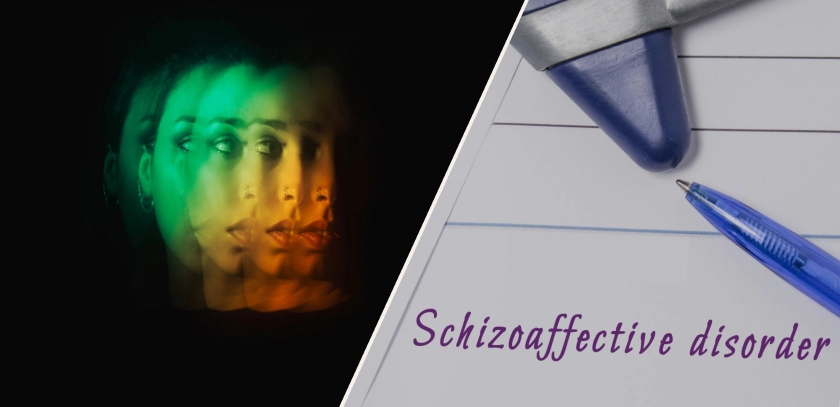
What’s the difference between schizophrenia and schizoaffective? Schizophrenia and Schizoaffective disorder are two very different mental health conditions that have a few overlaps in their symptoms.
While both disorders involve psychosis, schizophrenia is characterized by a wide range of cognitive and behavioral problems, while schizoaffective disorder involves both psychotic symptoms and mood disturbances. There are differences in the way that doctors diagnose and treat each disorder.
In this blog, we will discuss the difference between Schizophrenia VS Schizoaffective disorders. We will also be discussing these two disorders in further detail. So, Without further ado, let’s get into this!
What is Schizophrenia Mental Disorder
Schizophrenia is a severe mental disorder characterized by delusions, hallucinations, disorganized speech and behavior, and other cognitive difficulties. People with schizophrenia may also experience disruptions in their ability to think clearly and logically. The cause of this disorder is not known but is thought to be related to genetics and environmental factors.
It is the condition that is the most commonly associated with psychosis, and it can affect people of all ages. Symptoms of schizophrenia include delusions, hallucinations, disorganized speech or behavior, and impaired cognitive function, such as memory loss or difficulty concentrating. People who suffer from this disorder may also experience social withdrawal, depression, anxiety, and difficulty functioning in everyday life.
Schizoaffective Mental Disorder Symptoms
Schizoaffective disorder is a psychiatric condition characterized by both psychotic symptoms (such as hallucinations and delusions) and mood disturbances (like depression or mania). It is much less common than schizophrenia and is usually diagnosed in people who have experienced both types of symptoms at different points in time. The cause of schizoaffective disorder is not yet known, but it is thought to be related to genetics, environmental factors, and brain chemistry.
Common symptoms of schizoaffective disorder include:
- Hallucinations (seeing or hearing things that are not there)
- Delusions (believing in things that are not true)
- Irrational thinking and behavior
- Mood swings, such as depression or mania
- Difficulty sleeping or concentrating
- Social withdrawal and- Anxiety or agitation.
Schizophrenia Diagnosis
Diagnosis of schizophrenia is based on an individual’s reported symptoms, medical history, and physical exam. To be diagnosed with this disorder, an individual must have at least two of the following symptoms for at least one month:
- Delusions
- Hallucinations
- Disorganized speech or behavior
- Negative symptoms (decreased expression, apathy, social withdrawal)
In addition, the individual must have experienced significant impairment in their ability to function normally in their everyday life.
How to Support Someone With Schizophrenia
Schizophrenia is a complex mental disorder that affects millions of people worldwide. As a chronic condition, it requires ongoing care and support to help individuals manage its symptoms and lead fulfilling lives. In this blog post, we will explore some practical ways to support a loved one with schizophrenia, with an emphasis on the importance of compassion, empathy, and understanding throughout their journey.
1. Educate Yourself
One of the most empowering ways to support someone with schizophrenia is to educate yourself about the condition. Learn about the signs, symptoms, and treatment options available. By understanding the complex nature of schizophrenia, you will be better equipped to provide the necessary support and advocate for your loved one when needed.
2. Encourage Treatment and Medication Adherence
Treatment for schizophrenia often involves a combination of medications, psychotherapy, and support services. Encourage your loved one to adhere to their treatment plan and medication regimen. Offer assistance in scheduling appointments, picking up prescriptions, or attending therapy sessions if needed. Remember, consistency and persistence play a significant role in managing symptoms effectively.
3. Foster Open and Honest Communication
Schizophrenia can create communication challenges, as individuals may experience difficulties expressing their thoughts or perceiving reality accurately. Encourage open and honest conversations by creating a safe space for your loved one to express themselves without judgment. Avoid invalidating their experiences or dismissing their emotions, as this can intensify feelings of isolation.
4. Practice Active Listening and Empathy
Active listening is an essential skill when supporting someone with schizophrenia. Show genuine interest in their experiences and validate their feelings. Use empathy to understand their perspective and put yourself in their shoes. By doing so, you can provide comfort, reassurance, and understanding to your loved one during difficult moments.
5. Encourage Independence
While supporting your loved one, it is crucial to find a balance between assistance and promoting independence. Respect their autonomy and encourage them to engage in activities they enjoy, such as hobbies, socializing, or pursuing educational and career goals. Focus on their strengths and encourage their involvement in decisions that affect their lives.
6. Create a Supportive Environment
Living with schizophrenia can be overwhelming, and a supportive environment can make a significant difference. Foster a calm and structured living environment, ensuring basic needs like sleep, nutrition, and exercise are met. Encourage routines, as they can provide stability and reduce anxiety. Additionally, creating social connections and involving your loved one in a network of support services can be immensely beneficial.
7. Seek Support for Yourself
Supporting a loved one with schizophrenia requires patience, resilience, and self-care. Remember to prioritize your own mental and emotional well-being. Seek support from friends, family, or support groups to alleviate your own stress and gain valuable insights from others who have faced similar challenges.
What is Schizoaffective Mental Disorder?
Schizoaffective mental disorder is a condition that has a combination of symptoms from both schizophrenia and other mood disorders. In order to be diagnosed with this disorder, an individual must have experienced psychotic symptoms in addition to the usual depression or mania associated with bipolar disorder or major depressive disorder.
It is important to note that schizoaffective disorder is not the same as bipolar or major depressive disorder, though it has elements of both. But it is not a milder form of either illness. Schizoaffective disorder is its own distinct disorder and requires specific treatment.
Symptoms of Schizoaffective Mental Disorder
An ADHD Psychiatrist or mental health specialist will usually use the criteria for bipolar disorder and schizophrenia to diagnose schizoaffective disorder.
Some of the symptoms associated with this condition include:
- Delusions, hallucinations, or other psychotic symptoms
- Mood swings from depression to mania
- Difficulty concentrating or making decisions
- Problems sleeping
- Social withdrawal and isolation
- Anxiety or agitation
Schizoaffective Diagnosis
In order to be diagnosed with schizoaffective disorder, an individual must have experienced both psychotic symptoms and a mood disturbance for at least two weeks in a row. Additionally, the individual must not have had any major depressive or manic episodes within the same two-week period.
It is important to note that schizoaffective disorder diagnosis can be difficult and take some time. If you are experiencing symptoms of this condition, it is important to seek help from a mental health specialist. They will be able to evaluate your symptoms and give you an accurate diagnosis.
Schizophrenia VS Schizoaffective Differences and Similarities
There are a few important differences between schizophrenia and schizoaffective disorder. While both disorders involve psychosis, schizophrenia is characterized by a wide range of cognitive and behavioral problems, while schizoaffective disorder involves both psychotic symptoms and mood disturbances.
| Aspect | Schizophrenia | Schizoaffective |
| Characterized by a wide range of cognitive and behavioral problems. | Involves both psychotic symptoms and mood disturbances. | |
| Psychosis | Involves psychosis. | Involves psychosis. |
| Mood Disturbances | No mood disturbances. | Mood disturbances present alongside psychosis. |
| Symptoms | Hallucinations, delusions, disordered thinking and behavior, social withdrawal, difficulty concentrating. | Hallucinations, delusions, disordered thinking and behavior, social withdrawal, difficulty concentrating, and mood swings. |
| Treatment | Typically treated with antipsychotic medications. | Requires treatment for both psychotic symptoms and mood disturbances, often including mood stabilizers or antidepressants in addition to antipsychotic medication. |
| Impact on Life | Can cause severe disruption in an individual’s life. | Can also cause severe disruption in an individual’s life. |
| Overall Category | Psychotic Disorder | Mood Disorder with Psychotic Features |
Similarities
In terms of similarities, both disorders can cause severe disruption in an individual’s life. They also have similar symptoms, such as hallucinations, delusions, disordered thinking and behavior, social withdrawal, and difficulty concentrating.
Differences
The primary difference between schizophrenia and schizoaffective disorder is that schizoaffective disorder involves both psychotic symptoms and mood disturbances, while schizophrenia only involves psychosis. Additionally, while schizophrenia can be treated with antipsychotic medications, schizoaffective disorder also requires treatment for the mood disturbance component.
Treatment for Schizophrenia VS Schizoaffective Disorder
The treatment for both schizophrenia and schizoaffective disorder typically involves the use of antipsychotic medication to reduce psychotic symptoms. Additionally, psychotherapy can be used to help individuals manage their symptoms and work on coping strategies.
It is important to note that treatments will vary depending on each individual’s needs. Your doctor or mental health specialist will be able to recommend the best treatment plan for you.
Finally, support from family and friends is incredibly important when it comes to managing both schizophrenia and schizoaffective disorder. Having a strong social network can help individuals with these conditions stay on track with their treatments and cope with any challenges that arise.
Following are some of the treatments that may be used for both schizophrenia and schizoaffective disorder:
- Antipsychotic Medication – Antipsychotics are medications used to help reduce symptoms of psychosis, such as delusions and hallucinations. They can also help with mood swings associated with schizoaffective disorder.
- Psychotherapy – Psychotherapy is a type of- Cognitive Behavioral Therapy (CBT) – This type of therapy focuses on helping individuals identify and change unhealthy thought patterns.
- Supportive Therapy – This type of therapy is used to help individuals cope with the challenges that come with living with a mental health condition. It can also help them build skills for managing symptoms.
Living with schizophrenia or schizoaffective disorder can be very challenging, but it is important to remember that you are not alone. There are many treatments and support services available to help individuals manage their condition and live a fulfilling life. With the right treatment plan, individuals can lead a happy and productive life despite their diagnosis.
Final Thoughts
Schizophrenia and schizoaffective disorder are serious mental health conditions that can cause significant disruptions in an individual’s life. However, with the right support and treatment plan, it is possible for individuals to manage their symptoms and live a happy and productive life. If you or someone you love is living with schizophrenia or schizoaffective disorder, remember that you are not alone. There is a wide range of treatments and support services available to help you or your loved one manage their condition.
So, if you or someone you know is struggling with schizophrenia or schizoaffective disorder, reach out for help today. With the right treatment plan, individuals can continue living a fulfilling life despite their diagnosis.




